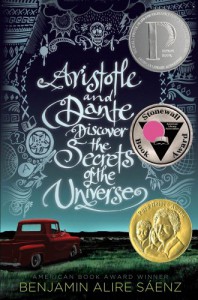Aristotle and Dante Discover the Secrets of the Universe

Plot Summary: Aristotle never had many friends. Then he met Dante. In Dante, he found someone with whom, despite their differences, he could be himself. Through their friendship, Aristotle and Dante discover truths not only about the world in general, but about themselves.
NPR Interview with Benjamin Alire Saenz
Review: I knew going into this book that I wasn't going to like it, because it's a coming of age story and, in my experience, most coming of age stories follow the same pattern: they're about two best friends who meet by chance but instantly know that the other person is Integral To Their Life, and then the narrator becomes disenchanted with his/her friend (who, of course, is innately good and wonderful and teaches the narrator something important), and then just when the narrator realizes how absolutely wonderful said friend is, something terrible happens to the friend. And that is exactly what happened in this book. Except this book has two very important differences that set it apart from all of those other books and ALMOST made me like it: 1) the story went on after the tragedy and 2) the two characters ended up being gay. In these coming of age novels, I always suspect the characters of being gay but they never actually are (or if they are, the author chooses not to expose this), and because these two actually are, it felt more honest, more real. And I thought that was great - not necessarily that they were gay, but that the author was honest about it. Which makes sense, because that's what this book is known for. I didn't know that prior to reading it and I'm glad that I didn't.
There are two reasons why I only gave this book 2 and a half stars. First of all, I just didn't really like any of the characters. They were both smart alecs and while I don't mind a bit of sass, the constant sarcasm and moodiness got really old really fast. It may just be that I'm not in that stage of my life anymore and so I find it to be annoying, haha.
Also, I just didn't believe that Aristotle was in love with Dante. I certainly believed throughout the book that he cared deeply about him, but as a friend. At the beginning of the book, I did think that there might be a possibility that they might have feelings for each other because Aristotle kept saying things about Dante being beautiful. But as soon as Dante came out to Aristotle, all of that stopped. I'm realizing now that maybe that was the author's way of trying to express Dante's repression of his true feelings, but to me, it caused Aristotle's acceptance of his feelings towards Dante to seem sudden and forced. It definitely didn't help that in order for Aristotle to recognize his feelings, his parents had to actually sit him down and explain to him that he was in love with Dante. When you're in love with someone, you don't need anyone to explain that to you. You just know. Mixed with the final chapter, which involved an intense make out session under the stars, the outcome of this book just seemed trite and ridiculous.
One thing that I did really like about this book was that Saenz did a really great job of conveying how teenagers come to learn who they are. I think that everyone goes through a phase where they're not really sure who they are or what they stand for. When we're kids, everything about us is so shaped by our parents. We're shaped by our parents' beliefs and our parents' lifestyles and who our parents think that we are. I think this is natural - it's simply a result of the fact that our parents are the people who we spend the most time with. But when we get to be teenagers, we start to figure out who we are as individuals, as people who are separate from our parents, and I think that can be really confusing for a lot of people. Saenz did a great job of showing both Aristotle and Dante's journeys as they discover who they are.
Ultimately, though, this great depiction wasn't quite enough to merit a great review from me. It didn't make up for the annoying parents or what I saw as a forced romance. I understand why some people might relate to and really enjoy this book, but for me, this one just didn't click, so it's only earned two and a half stars.
Recommended to: I would recommend this to any patron who is looking for a book that will reflect their own confusion about their path in life, regardless of sexual orientation. Although this is a LGBTQ book, it's not a book that is only relevant to that community and I think that it could appeal to lots of people - even if it didn't appeal to me. I would be hesitant to recommend this to a young teenager (one in middle school), because there is a lot of profanity, but I certainly would not prevent them from reading it if they found it on their own.


